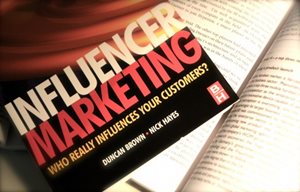B2B Influencer Marketing: Success Begins with Strategy
Almost ten years ago Duncan Brown and Nick Hayes wrote a book called “Influencer Marketing” where they talked about the first people to devise what we know as influencer marketing, small tech companies up against monolithic corporations, who realized that marketing shouldn’t be about getting to more people, but to the right people. Brown and Hayes were surprised that more marketers didn’t do it back then, citing that even though influencer marketing was born when digital made it a necessity, “marketing departments haven’t kept up with those changes, too busy moving to online tactics - web advertising, webinars, blogs and social media – to look deeper into who they’re communicating with and what those people need to hear.” Instead of influencers, Brown and Hayes explained, marketers were still ineffectually targeting the purchasers.
where they talked about the first people to devise what we know as influencer marketing, small tech companies up against monolithic corporations, who realized that marketing shouldn’t be about getting to more people, but to the right people. Brown and Hayes were surprised that more marketers didn’t do it back then, citing that even though influencer marketing was born when digital made it a necessity, “marketing departments haven’t kept up with those changes, too busy moving to online tactics - web advertising, webinars, blogs and social media – to look deeper into who they’re communicating with and what those people need to hear.” Instead of influencers, Brown and Hayes explained, marketers were still ineffectually targeting the purchasers.
The writers continued that when it comes to B2B purchases, such as software when “decisions are too complex (and I might add ‘expensive’) for individuals to make in isolation”, marketers should be working on targeting the “ecosystems” that make those purchasing decisions. Back in 2007, the authors mentioned there were very few examples of influencer marketing case studies in the public domain, and I find that to be true today as I research what tactics to try. There’s a lot of vague guidance and advice, and certainly few industry specific case studies out there.
Even though in many ways we’re still in the early stages of utilizing influencers, I truly believe that the term “influencer marketing” as a “type” of marketing won’t exist in a couple years. Just like many are talking about taking off the “e” from “e-commerce” or the “digital” from “digital marketing”, all marketing needs to become influencer marketing in order to be effective. I personally don’t do anything without influencers in mind because as marketers we want to reach the biggest, most relevant audience, right? And when 1% of millennials trust brands because of an ad, and 92% of consumers turn to people for product referrals above any other source, of course, it’s obvious that not using influencers is setting yourself up for failure.
What Exactly is “Influencer Marketing”?
For B2B, influencer marketing is leveraging individuals who are looked up to in your industry, for B2C, it’s using popular social media personalities who are relevant to your target audience in order to command interest and trust from consumers who more and more are starting to ignore traditional marketing. B2C is usually paid, while B2B can be any combination of rewards for the influencer, from more influence to barter for free products or services or actual payment. With B2C, marketers typically use agencies such as Science which started as a Pinterest analytics platform but now connects brands with influencers on social media; or Social Nature which has a platform with 100K followers who uses it to connect directly with brands, try their products and then post reviews to create 100K little mini-influencers. For B2B, we marketers are often on our own.
B2C, it’s using popular social media personalities who are relevant to your target audience in order to command interest and trust from consumers who more and more are starting to ignore traditional marketing. B2C is usually paid, while B2B can be any combination of rewards for the influencer, from more influence to barter for free products or services or actual payment. With B2C, marketers typically use agencies such as Science which started as a Pinterest analytics platform but now connects brands with influencers on social media; or Social Nature which has a platform with 100K followers who uses it to connect directly with brands, try their products and then post reviews to create 100K little mini-influencers. For B2B, we marketers are often on our own.
Influencer Marketing for B2B
The formula for influencer marketing in B2B is quite simple: you learn who the influencers are and engage with them. If you’re producing excellent, timely content and an excellent product, most likely they will help you promote it. You also want to try and hire people who have the social influence to produce content; this will boost both the content and your brand.
How Does Influencer Marketing Work?
When you do your marketing with influencers in mind, you see exponentially more relevant impressions and engagements on social media which ultimately progress to valuable leads. There’s a domino effect – if a thought leader is following you or engaging with you, and, of course, creating content for you – people are more likely to trust you.
Human Nature Gives it an Unknown Element
The only downfall with influencer marketing is that it’s not a given so may be hard to place in a traditional marketing plan – it’s not always predictable. Unlike a paid ad which you can guarantee will show up online, an influencer might ignore even your most awesome content. It depends on so many factors, of course, they’re human!
How Do You Get Influencers to Work With You?
Ultimately, you have to have a great product and good content as you can’t expect influencers to be on your team just because you reach out or engage with them.
If you do have great content, then by all means reach out to influencers, but be subtle. Learn what hashtags and handles are best for your posts on Twitter, for example, to attract like-minded people, but never message or essentially spam people by overusing their Twitter handles. Sharing others’ content and mentioning ideas you admire from thought leaders is great. But don’t ever push your own content directly to them, it’s a turn-off.
It’s not that dissimilar from a conversation at a party – if someone overhears you talking about something cool, they’ll probably come over and join in. By the same token, if someone is not interested in speaking with you, take the hint. Don’t keep using their Twitter handles and NEVER message a follower! I personally have hundreds of messages from people I have followed in my Twitter inbox, and never once have actually read one. I see them as a nuisance, not unlike millennials see paid ads.
Tools for Influencer Marketing
There are multiple softwares out there that promise to help identify influencers. A recent article  in Inc. Magazine listed “8 Companies That Can Fuel Your Influencer Marketing”. For the purpose of this blog post (and my own education), I took a close look at them to see if any might be useful for B2B. It was really unclear, at least to me, from most of their websites, what exactly they do for marketers. It’s rather ironic for an industry that is made up of marketers, there are really no ROI stories on most of these companies’ websites. I came away wondering what exactly any of these companies would actually do for me if I were to hire them.
in Inc. Magazine listed “8 Companies That Can Fuel Your Influencer Marketing”. For the purpose of this blog post (and my own education), I took a close look at them to see if any might be useful for B2B. It was really unclear, at least to me, from most of their websites, what exactly they do for marketers. It’s rather ironic for an industry that is made up of marketers, there are really no ROI stories on most of these companies’ websites. I came away wondering what exactly any of these companies would actually do for me if I were to hire them.
So All That Said, What Do I Want?
It’s simple, I want a software that will identify potential thought leaders with my particular keywords that are likely to engage with me, thereby helping me get my content out there and reach a relevant audience. They are accounts that do not only have a steady flow of their own push marketing tweets but primarily retweet and curate others’ content. I know those accounts are out there and can find this out myself, but it is very time-consuming. Most marketers, like me, don’t have time or energy to literally go through thousands of Twitter followers.
Back to Square One
What this shows me is that there will be a lot of people who will buy these services for “influencer marketing” but they are not exactly getting “influencer marketing”, they are getting content production help or traditional PR or a software that tells them who has retweeted them and which of their followers has a lot of other followers.
Sirius Decisions has reported that as much as 70% of content goes unused; using influencers to both help create content and spread the word about your content is a sure fire way to fix that problem, but getting the right data about who those influencers are and how they might be relevant to your marketing strategy is probably one of the biggest things holding back marketers today.

Leah Kinthaert
Leah is a Demand Generation Expert with 10 years of B2C and B2B marketing experience and is currently a Digital Transformation Lead at Informa. Previously, she was Director of Marketing at Mobilengine where she managed content strategy, curation, and editorial to deliver creative, intelligent, and relevant content for their website and all social channels. Prior to Mobilengine, she was the Acquisition Marketing Manager at InsuraMatch.